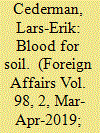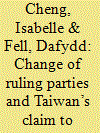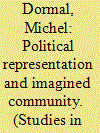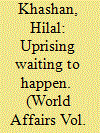| Srl | Item |
| 1 |
ID:
163307


|
|
|
|
|
| Summary/Abstract |
Since the French Revolution, nationalism—the idea that state borders should coincide with national communities—has constituted the core source of political legitimacy around the world. As nationalism spread from western Europe in the early nineteenth century, it became increasingly ethnic in nature. In places where the state and the nation did not match up, such as Germany, Italy, and most of eastern Europe, the nation tended to be defined in terms of ethnicity, which led to violent processes of unification or secession. At the beginning of the twentieth century, ethnic nationalism came to disrupt political borders even more, leading to the breakup of multiethnic empires, including the Habsburg, Ottoman, and Russian ones. By changing the size of Europe’s political units, this undermined the balance of power and contributed to two world wars
|
|
|
|
|
|
|
|
|
|
|
|
|
|
|
|
| 2 |
ID:
134307


|
|
|
|
|
| Summary/Abstract |
In recent years, female marriage migration from China and Southeast Asia has significantly increased the number of foreign-born citizens in Taiwan. This article is a preliminary investigation into how political parties responded to the growing multicultural makeup of the national community between 2000 and 2012. We examine the content of the Understanding Taiwan textbook, the election publicity of the two major political parties, citizenship legislation, and the results of interviewing immigrant women. The findings show that the change in the ruling party did make differences in terms of both parties’ projection of immigrant women in election propaganda and citizenship legislation. However, inward-looking multiculturalism is practised by the two main political parties in Taiwan to forge national identity and enhance national cohesion rather than to promote the recognition of immigrants’ different cultural heritage.
|
|
|
|
|
|
|
|
|
|
|
|
|
|
|
|
| 3 |
ID:
118353


|
|
|
|
|
| Publication |
2012.
|
| Summary/Abstract |
Discussions of nation-building often focus on political elites, who are considered the makers of new communities. This article seeks to sketch out a different approach. It suggests thinking of representative relations as the site of a negotiation of collective identity. Drawing on recent discussions in political theory, the first part of the article discusses conceptual implications of this assumption, arguing that representation should be analysed in terms of its symbolic structure. The second part offers a historical case study of the Grand-Duchy of Luxembourg. It explores how processes of political democratisation and imagination of national community were deeply interconnected in the period from 1890 to 1939. The article illustrates how the representative politisation of social conflict may trigger nation-building.
|
|
|
|
|
|
|
|
|
|
|
|
|
|
|
|
| 4 |
ID:
146712


|
|
|
|
|
| Contents |
This paper contends that the Syrian Ba’ath Party’s authoritarian bargain introduced by the late Hafez al-Assad soon after he assumed the presidency in 1971, expired a few years prior to the eruptions of 2011. It demonstrates this termination by examining Syria’s political and social situation as well as the inability of the government to maintain a balance between regime security and the provision of welfare to the public. Despite a decline of welfare benefits, there was no reduction in the application of extreme coercion. Matters worsened with the alliance between the regime and the new urban business class that alienated the countryside, which previously had provided the bulwark against the threat of urban forces of change.
|
|
|
|
|
|
|
|
|
|
|
|
|
|
|
|